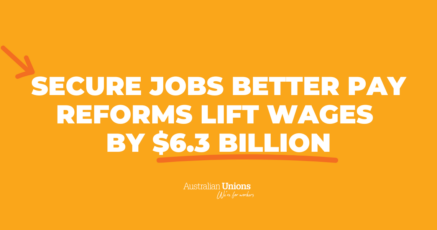Contrary to misinformation from the business lobby, increasing wages actually helps create more jobs. We have a once-a-year opportunity to raise wages for almost one in four workers. The Australian Council of Trade Unions has called for a 5.5.% increase to the minimum wage as part of the Annual Wage Review.
As happens with each Review, big business shows little to no intent to support the very workers that have kept major companies – and the Australian economy – afloat during the pandemic. But curiously enough, the mutterings from big business about opposing a minimum wage increase citing ‘weak productivity’ have petered out in recent days.
Strong productivity figures from last week showed a productivity growth of 2.8 per cent for the year to March, while wages went backwards in real terms by 2.7 per cent in the same period.
But just in case there are any more question marks over the matter, we’ve rounded up some great reasons as to why a meaningful increase to the minimum wage is the best thing for you and for our economy.
Crunching the numbers
We know decent Award and minimum wages helps employment flourish – we’ve seen it happening for decades.
In the 1990s, a group of American economists compared the number of fast-food jobs in New Jersey with its neighbouring state, Pennsylvania. The economists found a 13 per cent increase in fast-food restaurant employment in New Jersey relative to stores in Pennsylvania.
What was the difference between these two states that resulted in such a remarkable difference? New Jersey had just increased its minimum wage whereas Pennsylvania had kept it at the same low rate.
The study earned those researchers the 2021 Nobel Prize in Economic Sciences. By this time, the study had already birthed a wave of similar studies in other parts of the world. Research conducted in minimum wage increases in Brazil, Indonesia and Germany also found that employment numbers either went up or remained the same when minimum wages were increased.
Here in Australia, we can see the same outcomes. Like in New Jersey, minimum wage workers are often in service industries, like fast-food and retail employment or aged care and disability care, and our regional areas are being hit hardest.
As the Shop, Distributive and Allied Employees Association (SDA) points out, these workers make up a huge portion of regional populations, meaning that regional economies rely on workers.
“One of the best and fairest investments for regional communities is increasing the take-home pay of retail and fast food workers and placing more dollars back into household budgets,” SDA Newcastle Branch secretary Barbara Nebart says.
In short – healthy wages create healthy and growing economies.
Introducing a ‘living wage’
In order to reach equity, fairness and a stable economy, a minimum wage needs to reflect what we call a living wage.
We hardly need to rely on economists to tell us that inflation is a massive issue – we see it all around us. Housing prices, groceries, fuel and childcare costs are skyrocketing and many of us simply cannot afford to cover all the bases on $20.33 per hour, especially when those hours aren’t always full-time.
That’s exactly why unions are calling for a 5.5 per cent increase in the minimum wage – a figure that would amount to an actual living wage so that workers aren’t forced into poverty.
Our research also shows that union members are much more likely to take home a living wage, earning roughly $250 more per week than non-union members.







SHARE:
The case for increasing minimum wage